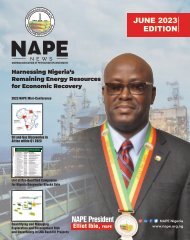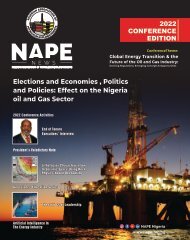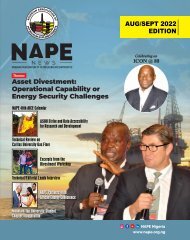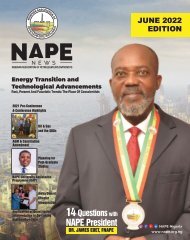You also want an ePaper? Increase the reach of your titles
YUMPU automatically turns print PDFs into web optimized ePapers that Google loves.
Practical Skillset for Young Professionals to<br />
Advance their Career in an Energy Transiting<br />
21st Century<br />
“Times have changed”, we commonly say; with this requiring equivalent changes to the way a number of things are done in those times.<br />
Over the years, accompanying each passing century are new and/or improved ways of carrying out various activities, to thrive in that space of time. Hence,<br />
it's imperative for young professionals to stay abreast of these new/improved approaches to stay afloat in a very competitive and fast-moving world.<br />
The transition of dominant energy sources from one or more sources to another or others is not immune to this evolution through centuries, although this<br />
happened slowly over time (Figure 1). From Figure 1 below, traditional biomass (i.e. the burning of solid fuels such as crop waste, charcoal or wood) was<br />
the dominant source of energy worldwide until the mid-19th century, which saw the rise of coal as a result of the industrial revolution. This was then followed<br />
by oil, gas and hydropower in the 20th century. The inclusion of nuclear energy in the energy mix happened in the 1960s, while the likes of solar and wind<br />
energy were added in the 1980s.<br />
The 21st century has witnessed a great deal of push to switch the world's energy source from fossil fuels to an energy mix dominated by low-carbon<br />
sources of energy (i.e. renewable technologies and nuclear power). This is driven by environmental concerns (the quest to have cleaner/green energy),<br />
technological advancement, changes in economic and political landscape, and demand for greater convenience.<br />
For Young Professionals to thrive in a uniquely<br />
challenging massive energy transiting world,<br />
which is yet full of opportunities, reskilling will be<br />
required in a number of computer and<br />
mathematical skills, as well as other areas such<br />
as construction, installation, maintenance and<br />
transportation, and to perform site selections and<br />
assessments (Harper & Merten, 2021). In<br />
comparison to training, reskilling requires some<br />
degree of behavioural change.<br />
According to the 2020 EY Report on O&G Digital<br />
Transformation and the Workforce, the oil and<br />
gas sector has a gap between skill importance<br />
and current maturity for some computer/digital<br />
skills that is startling:<br />
Ÿ Digital engineering – 68% importance vs<br />
31% maturity.<br />
Ÿ Data science – 85% importance vs 23%<br />
Ÿ<br />
maturity.<br />
Artificial intelligence – 68% importance<br />
vs 9% maturity.<br />
Ÿ Data analytics – 91% importance vs 32%<br />
maturity (Harper & Merten, 2021).<br />
In as much as the current energy transition is a<br />
and will be an ongoing effort, it's already ramping<br />
Figure 1: Global primary energy consumption by source (Ritchie, Roser, Rosado, 2020); After Smil<br />
(2016) and BP (2021).<br />
up in major ways. According to the International<br />
Renewable Energy Agency (IRENA), employment in the renewable sector hit 11 million jobs in 2018, compared to the 10.3 million jobs in 2017; with solar<br />
photovoltaic employing the most, followed by liquid biofuel, hydropower, and wind energy.<br />
Transiting to renewable energy sources doesn't imply beginning from scratch as overlap lies in a number of areas. An example lies between offshore oil<br />
and wind: the existing experience and operations of building offshore oil platforms can be leveraged for offshore wind services, such as, construction and<br />
maintenance, having significant synergies with the offshore oil and gas sector. Also, important scientific data (such as geoscience and environmental data)<br />
will be required to select sites for offshore wind projects and to determine feasibility.<br />
The world is indeed evolving, same as the opportunities that lie therein, hence, it's imperative for young professionals to acquire the skills required in a fastchanging<br />
and competitive world to advance their career.<br />
Works Cited<br />
BP. (2021). Statistical Review of World Energy . London: Whitehouse Associates.<br />
EY. (2020, July 05). Oil and Gas Digital Skills Survey . Retrieved April 04, <strong>2022</strong>, from EYh:t tps://ey.com/oilandgas/digitalskills<br />
Harper, J., & Merten, S. (2021, June 16) . Engineers and geoscientists need new skills for a r enewable future, Retrived April 04, <strong>2022</strong>, from<br />
https://www.elsevier.com/connect/engineers-need-new-digital-skills-for-a-future-in-renewable-energy.<br />
Ritchie, H., Roser, M., & Rosado, P. (2020 ) . Our World in Data. Retrieved April 04, <strong>2022</strong>f,rom https://ourworldindata.org/energy<br />
Smil, V. (2016, December 14). Vaclav Smil. Retrived April 04, <strong>2022</strong>, from https://vaclavsmil.com/2016/12/14/energy-transitions-global-and-nationalperspectives-second-expanded-and-updated-edtion/<br />
NAPENEWS AUG/SEPT <strong>2022</strong> 65










